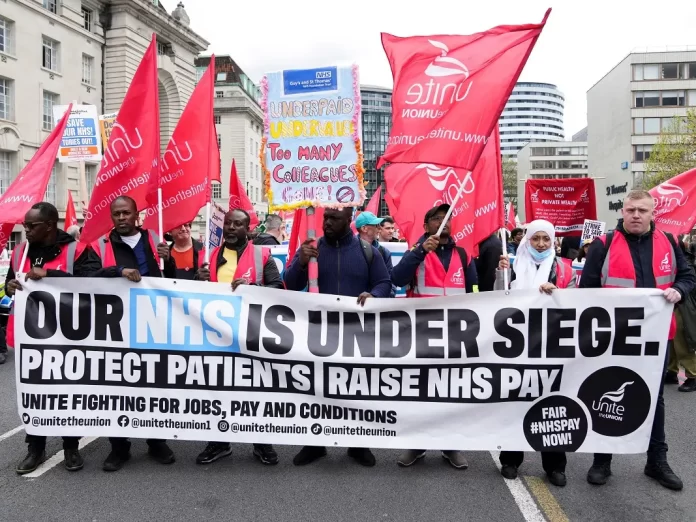The largest industrial action in the National Health Service (NHS)’s (state-funded) history is scheduled to take place in the United Kingdom, where junior doctors are planning a five-day walkout over pay and working conditions.
The British Medical Association (BMA) members’ historic strike will start at seven in the morning (0600 GMT) on Thursday and go until 7:00 a.m last Tuesday.
Before the walkout, BMA leaders Robert Laurenson and Vivek Trivedi said, “Today marks the beginning of the longest single walkout by doctors in the history of the NHS, but this is still not a record that needs to be in the history books.”
read more; UK Nursing union warns next strike will be doubled if pay negotiations stay stall
The statement continued, “The UK government will simply follow the example of the government in Scotland and drop their absurd precondition of not talking while strikes are announced and produce an offer that is credible to the doctors they are speaking with.”
The two BMA leaders emphasized further that the total lack of flexibility displayed by the UK government is “baffling, frustrating, and ultimately destructive for everyone who wants waiting lists to decrease and NHS staffing levels to increase.”
According to the BMA, there were nearly three million patients who had been waiting longer than 18 months when they finally received treatment in April.
This was a record number of patients waiting for care.
In recent months, there has been an increase in tension between junior doctors and the UK government. Junior doctors are requesting a return to their pay levels from 2008–2009, but London estimates that this would entail an average pay award of about 35%.
According to the Junior Doctors Committee of the British Medical Association, since salaries have not kept up with the rate of inflation, doctors have actually seen a real-term pay cut of 26% over the past 15 years.
In an effort to combat inflation, the UK government has offered an extra 5% in pay rather than retroactively increasing it to reflect inflation since 2008 because it would be too expensive.
Given that the nation is already dealing with a sizable pandemic backlog, the most recent walkout has raised concerns for patient safety.
Patient appointments have been under more pressure recently as nurses, ambulance personnel, and other medical staff have all joined picket lines.
Radiographers will start their 48-hour strike on July 25 after senior hospital doctors, or consultants, in the UK, do the same on July 20.
In recent months, junior doctors in England have staged a number of walkouts in order to demand a 35 percent pay increase. But 175,000 outpatient appointments and procedures were postponed during the three-day strike.
The government has instituted strike legislation as a fanciful response to the conflict in order to control industrial actions in the crucial industries of the nation, requiring the staff to provide a minimal level of service during the strike or risk being fired.












